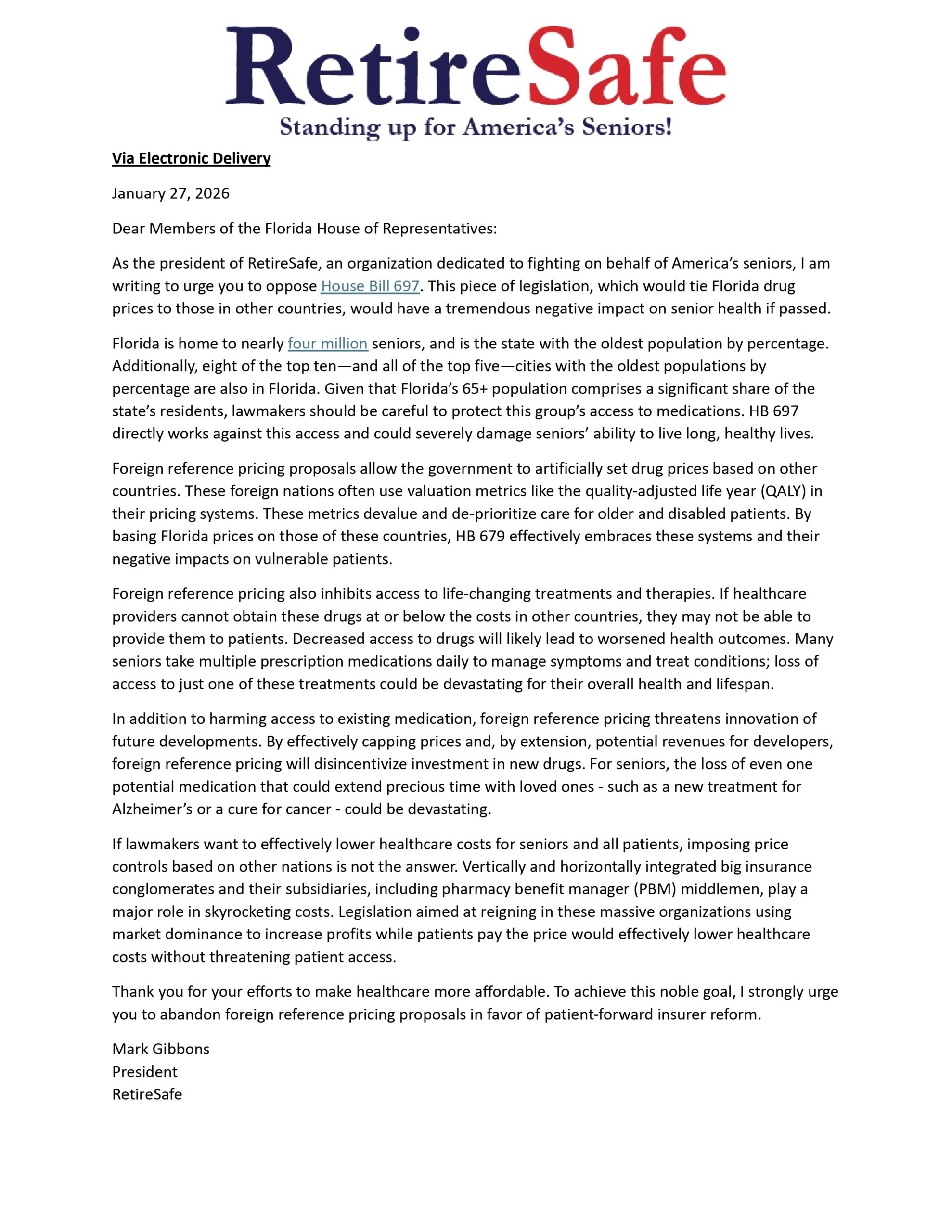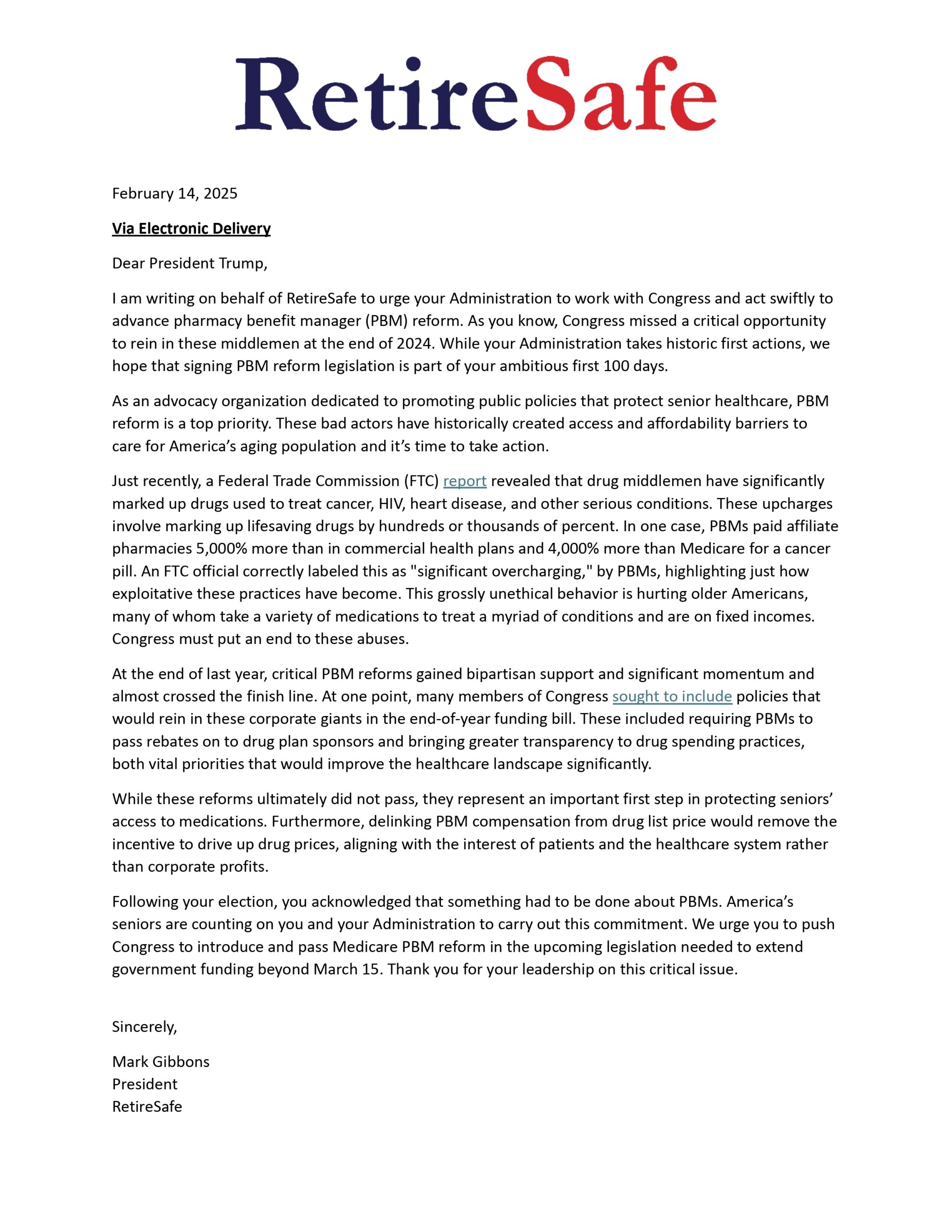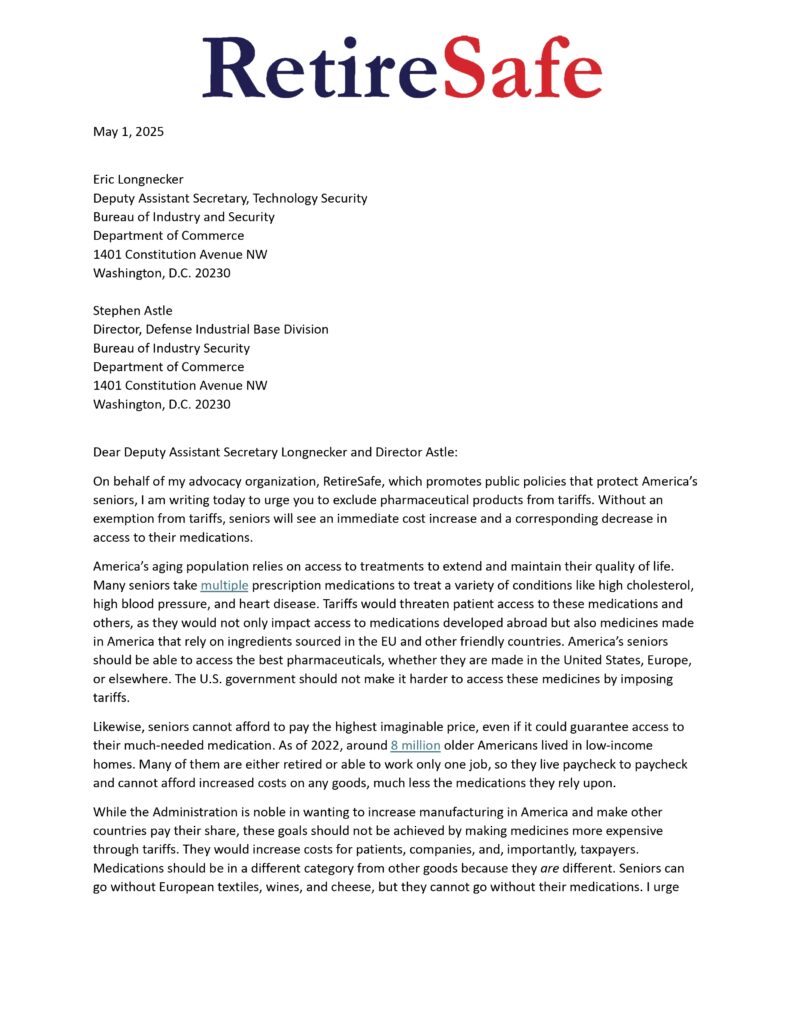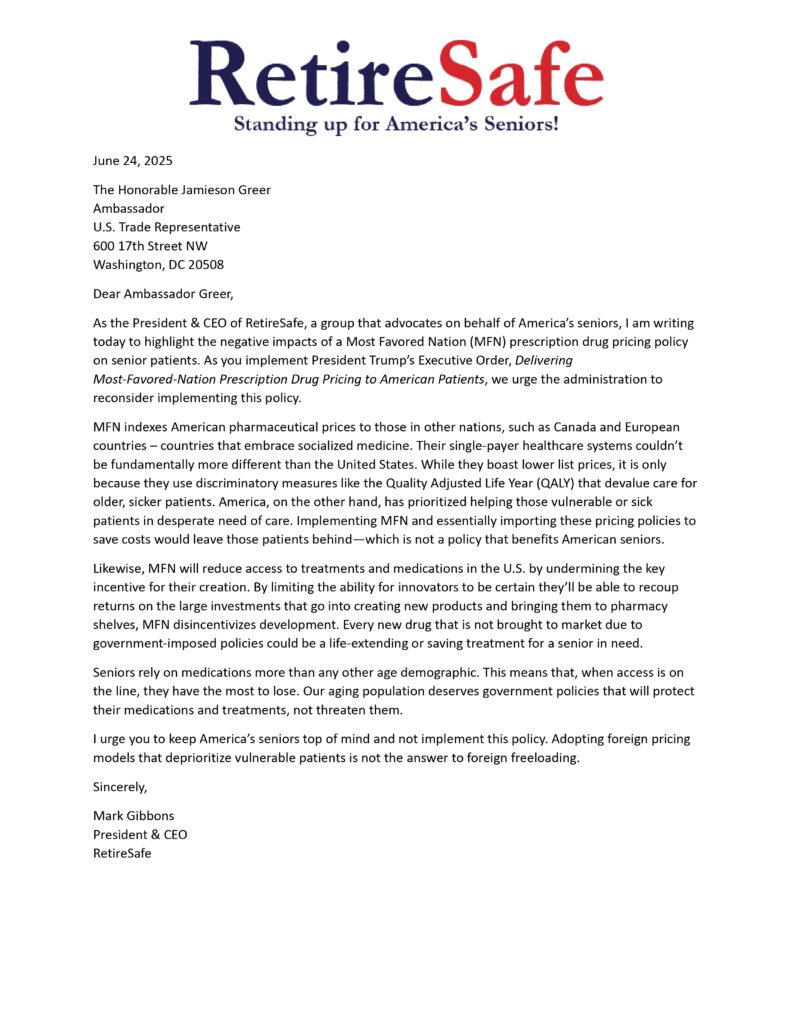Legislation

Latest News
December 10, 2025 – Today, RetireSafe released the following statement applauding the recent introduction of the Pharmacy Benefit Manager (PBM) Price Transparency and Accountability Act in the United States Senate Finance Committee:
“Senior advocacy organization RetireSafe commends members of the Senate Finance Committee for recently introducing bipartisan PBM reform legislation. Currently, PBMs overcharge patients and promote high-priced medications, increasing out-of-pocket costs in order to boost their profits. If passed, the Pharmacy Benefit Manager (PBM) Price Transparency and Accountability Act will take the steps needed to stop these bad actors from driving up drug prices for seniors in need.
“The legislation would specifically increase PBM reporting requirements to Medicare Part D plan sponsors and allow these sponsors to audit their PBMs for compliance within contracts. This will help ensure that seniors, in particular, are protected from the opaque, cost-increasing practices of drug middlemen. Many seniors take multiple medications to treat various conditions and maintain their overall quality of life, and they rely on consistent, affordable access to these drugs. Members of Congress who want to protect senior patients should be swift to support this PBM reform legislation to ensure that every senior can access the treatments they need.”

November 19, 2025 – Today, RetireSafe composed and organized a sign-on letter to Congress in support of the RESULTS Act:
RetireSafe and many other organizations have co-signed a letter to Senate Majority Leader John Thune, Senate Minority Leader Charles Schumer, Speaker of the House Mike Johnson, and House Minority Leader Hakeem Jeffries in strong support of the Reforming and Enhancing Sustainable Updates to Laboratory Testing Services (RESULTS) Act. This act aims to help ensure that medical laboratory tests remain accurate, accessible, and affordable for the many senior Americans that rely on them.
Click here to read the full letter.

May 20, 2025 – Today, RetireSafe released the following statement expressing opposition to President Trump’s executive order implementing the “most favored nation” (MFN) policy in Medicare:
“The senior advocacy organization RetireSafe stands opposed to President Trump’s new executive order implementing the “most favored nation” (MFN) policy into Medicare. As an organization that fights on behalf of the Medicare beneficiaries that this policy will most impact, we can confidently state that this policy will harm America’s seniors far more than help them. By giving other nations the power to effectively control Medicare prices, MFN will decrease access to treatments seniors rely upon. Furthermore, altering the Medicare market could have unintended or unforeseen side effects on senior treatments more broadly, as well as premium costs, and mirroring smaller socialized healthcare markets would only upend a working program and cause larger cost issues in the long term.
“However, the impacts of the implementation of this devastating policy will extend beyond Medicare beneficiaries. Drugmakers writ large may choose to pull back on investing in new developments as they fear a price set by foreign governments will inhibit their ability to recoup returns on their investment. RetireSafe urges the Administration to reconsider utilizing MFN in Medicare to protect seniors and their access to treatments that allow them to live long, fulfilling lives.”

Washington, DC (November 12, 2024) – RetireSafe issued the following statement regarding the election of Donald Trump as the next President of the United States of America.

“We extend our congratulations to the newly-elected President of the United States, Donald Trump. Moving forward, RetireSafe is eager to work with his Administration to promote healthcare policies that will protect America’s aging population. Although we have reached the end of a tough election season, the real work lies ahead as we pursue a pro-patient agenda that will better the lives of our nation’s seniors. This includes protecting and strengthening Medicare and addressing policies that disrupt and worsen seniors’ access to high-quality healthcare.
RetireSafe urges President-elect Trump to work alongside the new Congress to enact legislation that ensures access to essential medications. Seniors, many of whom are on fixed incomes and require multiple medications to treat various conditions, need leaders who will champion their healthcare needs and concerns. This includes protecting and preserving Social Security and Medicare, which allow them to access their much-needed medications.”

Outreach and Advocation
A core pillar of RetireSafe’s mission is “advocating for YOU!”
One way we put that into practice is by sending letters directly to government officials — urging action or offering commentary on key issues. Below, you’ll find letters straight from the President and CEO’s desk, addressing recent policies and decisions that impact the rights and well-being of American seniors.
Current Bills
H.R.1339: Safeguarding Social Security and Medicare Act
This bill requires the Government Accountability Office to study and provide recommendations to Congress with respect to the effect of inflation and cost-of-living increases on Medicare and Social Security.
H.R.3580: Oversight of Medicare Billing Code Cost Act
This bill requires the Office of the Inspector General of the Department of Health and Human Services to report on the processes for adding, modifying, and removing billing codes under Medicare. The report must include recommendations for administrative and legislative changes that may improve the transparency and oversight of these processes.
H.R.1950: Protect Social Security and Medicare Act
This bill requires a two-thirds vote before Congress may consider legislation that would reduce retirement, health, or other benefits administered by the Social Security Administration or the Centers for Medicare & Medicaid Services.
H.R.4619: Medicare Mental Health Inpatient Equity Act of 2025
This bill removes the 190-day lifetime limit on inpatient psychiatric hospital services under Medicare.
H.R.500: Medicare Hearing Aid Coverage Act of 2025
This bill allows for Medicare coverage of hearing aids and related examinations. The Government Accountability Office must study programs that provide assistance for hearing aids and related examinations for individuals with hearing loss.
H.R.3023: Preventing Hospital Overbilling of Medicare Act
This bill repeals certain exceptions to site-neutral payments with respect to Medicare payments to an off-campus outpatient department of a health care provider. It also requires providers to use separate, unique health identifiers when submitting a claim to a health insurance issuer for services provided at an off-campus outpatient department.
H.R.610: Close the Medigap Act of 2025
This bill (1) expands guaranteed issue rights with respect to Medigap policies (Medicare supplemental health insurance policies), (2) eliminates certain limitations on Medigap policies for newly eligible Medicare beneficiaries, and (3) modifies other provisions related to Medigap policies.
H.R.1667: Acupuncture for Our Seniors Act of 2025
This bill provides for Medicare coverage of acupuncturist services, including those provided by a physician (as authorized under state law).
H.R.950: Saving Seniors Money on Prescriptions Act
This bill establishes reporting requirements for pharmacy benefit managers (PBMs) under the Medicare prescription drug benefit and Medicare Advantage, particularly relating to the prices of prescription drugs.
H.R.559: Seniors in the Workforce Tax Relief Act
This bill establishes a new above-the-line federal tax deduction through 2029 for individuals who attain the age of 65 before the end of the tax year. (Above-the-line deductions are subtracted from gross income to calculate adjusted gross income.)
H.R.4967: Keep Seniors Fed Act
This bill amends the Supplemental Nutrition Assistance Program (SNAP) to exempt certain Social Security benefits (e.g., retirement and disability benefits) from household income for the purposes of determining program eligibility.
H.R.1672: Maintaining Investments in New Innovation Act
This bill requires drug products with genetically targeted technology to have had market approval for at least 11 years in order to qualify for the Medicare Drug Price Negotiation Program.
H.R.5269: Reforming and Enhancing Sustainable Updates to Laboratory Testing Services (RESULTS) Act
This bill reforms how Medicare sets laboratory test payment rates to use more representative data, reduce reporting burdens, and prevent steep cuts that could limit seniors’ access to essential lab services.
H.R.2172: Preserving Patient Access to Home Infusion Act
This bill clarifies and updates Medicare home infusion therapy coverage and payment rules to ensure patients can continue safely receiving IV treatments at home without disruptions or access barriers.
H.R.2757/S.1996: Medicare Audiology Access Improvement Act of 2025
This bill provides for Medicare coverage of certain audiology services. Specifically, the bill expands coverage to include diagnostic and treatment services that are furnished by audiologists and that would otherwise be covered if provided by a physician, including incidental services, regardless of whether such services are provided pursuant to a referral from, or under the supervision of, a physician or other health care practitioner.
H.R.842/S.339: Nancy Gardner Sewell Medicare Multi-Cancer Early Detection (MCED) Screening Coverage Act
This bill allows, beginning in 2028, for Medicare coverage and payment for multi-cancer early detection screening tests that are approved by the Food and Drug Administration and that are used to screen for cancer across many cancer types, if the Centers for Medicare & Medicaid Services determines such coverage is appropriate.
H.R.668/S.506: Coordinating Care for Senior Veterans and Wounded Warriors Act
This bill requires the Department of Veterans Affairs (VA) to implement a three-year pilot program to coordinate, navigate, and manage care and benefits for veterans who are enrolled in both the Medicare program and the VA health care system.
H.R.2793/S.2810: Retirement Freedom Act
This bill allows an individual to opt out of Medicare hospital services benefits without also having to opt out of Social Security benefits and without having to repay Medicare hospital services benefits already received. The bill also allows an individual to opt back in with no penalty.
H.R.2045/S.2084: Medicare Dental, Vision, and Hearing Benefit Act of 2025
This bill provides for Medicare coverage of dental, vision, and hearing care. Coverage includes (1) routine dental cleanings and exams, basic and major dental services, emergency dental care, and dentures; (2) routine eye exams, eyeglasses, and contact lenses; and (3) routine hearing exams, hearing aids, and exams for hearing aids.
H.R.1303/S.750: Protecting America’s Seniors’ Access to Care Act
This bill prohibits administration, implementation, or enforcement of the rule titled Medicare and Medicaid Programs; Minimum Staffing Standards for Long-Term Care Facilities and Medicaid Institutional Payment Transparency Reporting, which was issued by the Centers for Medicare & Medicaid Services on May 10, 2024.
S.2617: Reducing Drug Prices for Seniors Act
This bill requires the coinsurance amount for covered drugs under the Medicare prescription drug benefit to be based on the net price of the drug (i.e., the negotiated price under the prescription drug plan net of any manufacturer price concessions), rather than the list price of the drug, if the net price is lower.
S.106: Chiropractic Medicare Coverage Modernization Act of 2025
This bill expands Medicare coverage of chiropractic services to include all services provided by chiropractors, rather than only subluxation corrections through manual manipulation of the spine.
S.335: Rural Hospital Support Act
This bill modifies and extends certain payment adjustments for rural hospitals under Medicare’s inpatient prospective payment system.
S.36: Protect Our Seniors Act
This bill establishes Senate budget enforcement procedures (known as points of order) against measures that (1) reduce Medicare or Social Security benefits, or (2) use revenue or savings from the Medicare program to offset the cost of provisions unrelated to carrying out Medicare.
S.2770: Share the Savings with Seniors Act
This bill limits cost-sharing for chronic care drugs under the Medicare prescription drug benefit. Chronic care drugs include blood glucose regulators other than insulin, anticoagulants, and other categories of drugs as specified in the bill.






